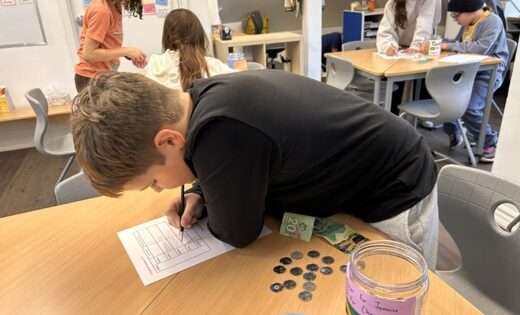on
BY DAVE RANKIN
There is this “je ne sais quoi” about comic books that fans, critics, parents, and even teachers throughout the ages have been trying to grasp. The ability to capture the minds of the “young at heart” with dazzling displays of character development and life lessons all wrapped up between fact and fiction should quell any notion that comic books are not adequate pieces of literature.
It’s truly a work of art capturing the attention span of readers within approximately twenty-two pages. The fact that we can see a bit of ourselves in these characters is impressive. What’s more impressive is that we can use their stories of strength and resilience as a moral compass in our everyday lives. It’s for this very same reason why our muse for this week’s Classic Man, Tredel The Comic God first started reading comics.
“It was kind of a sense of escapism and the wonderful things they were able to do. Like who doesn’t want to fly or swing through a city,” says the Comic God. As Tredel was saying that, I had quickly envisioned myself having the gift of flight and escaping this dreaded season of snow and gusts of subzero temperatures. Like the brother said, “Who wouldn’t want to fly?”
“One of the first supernatural characters I liked was Peter Pan because he never grew old and he always flew around. I was like, I want to get to be a kid forever.” We both laughed at the fact that he mentioned Peter Pan. But it made sense. The escapism that Peter Pan brought to the big screen was a force like no other. The freedom to explore coupled with the realms of innocence. I digress but rightfully so.
As much as we both appreciated the “amazing things” that superheroes could do. It was, “The fact that they go out of their way to help themselves and help others” that Tredel found, ”Very inspiring.” For those who don’t know, this is where the magic happens in the comic book world. Characters from: Black Panther, John Henry, Misty Knight, to Monica Rambeau and a whole slew of others, they were all created to inspire.
My next question was quite obvious, but I had to know who some of his favourite characters were. Tredel named: Spiderman, John Stewart aka “The Black” Green Lantern, and Teen Titans, especially Cyborg as some of his favorites. He added that he, ”He connected with Cyborg. He reminded me of whom I was in my friend groups. Him being a bigger guy, and very positive.”
We also had quite the chuckle when Tredel described an episode where Cyborg made 4-meat lasagna saying that, ”This is something that he would do.” As much as he professed his love for these characters, it was his love for Dragonball Z that pushed Tredel to make the leap into illustration and storytelling as a child. “I began making my own Spiderman who looked like me. I also began to make my own characters. Then I began to think to myself, this is really cool. This is something that I want to do.”
When asked about his first original character, Tredel vividly remembers a character that bore the same name of DC’s first African superhero, Black Lightning. He describes his character as a “Kid who worked with a scientist, and due to an experiment gone wrong, gets frozen in time only to wake up in the future with superpowers. It was a cross between Static Shock and Futurama. I was only ten at the time,” he added.
The natural step in progression was choosing a renowned school of the arts. And Sheridan became the choice. “It was amazing because I was drawing all day, as opposed to high school where I was doodling on my math test.” This quote instantly took me to some of my students who, in between lessons would do the same. The flashbacks of telling my student to, “Stay focused” is something I’m sure Tredel became accustomed to hearing.
Tredel credits his professors for teaching him the concept of gesture drawing and also drawing from reference that helped him hone his skills. “I never had taken a face from one character, clothes from another, placed them into an environment from another character and mixed them all together. I really learned a lot about that process.”
It was here where I began asking about his Black History Comic book hero series located on his YouTube channel. “I’m a comic book nerd and I learned a lot about these characters. So, I thought it would be cool to get them out there, to show the representation, and for people to learn more about them.”
He’s right. Since the first appearance of Black Panther in the 1966 Fantastic Four comic book, representation in this space has always been a factor. It’s left our people yearning for relatable characters who could compete with the likes of a Batman or Wonder Woman.
It’s also the reason why Tredel began his series with Marvel’s Storm, the “sci-fi high priestess” who controls the weather. “She’s one of the first black female characters I’ve seen. And she’s so powerful. Thought it would be great to start with her because she is an icon. She embodies what a black female superhero should be.”
Storm’s first appearance in 1975 filled a void that DC failed with their first black female superhero, Nubia, the twin sister of Wonder Woman. Storm’s exploits in the comic book series eventually led to her becoming the leader of the famed X-Men.
Turning our focus to some of his current work. Tredel enthusiastically tells me about his short stories. “I do this thing called One Shots. They are really short comic book stories that I can throw out there to the public.” It is here that I learned about Captain Action, a no nonsense superhero about his business. Tredel also tells me about his children’s series, Hip Hop Heroz, an illustration weaving ‘musical undertones and life lessons’ currently available on Amazon.
As for his future plans, Tredel advised to be on the lookout for a new series. “I have a comic that I’m currently writing that I’ll be showing the behind the scenes work for in March.” While the name of the comic is still pending, the small bits and pieces I was privy to during our interview sound intriguing. “It’s about a character named Onyx who lives in a Wild, Wild West type of world. His mission is to rescue his clan from an opposing cult who has stolen their resources.”
Comic writers and illustrators like Tredel have an important place in this world. They are griots meshing our past, present, and future into captivating script letting the world know that we belong on this stage. You can learn more about Tredel by visiting https://thecomicgod.com.
Stay in the loop with exclusive news, stories, and insights—delivered straight to your inbox. No fluff, just real content that matters. Sign up today!
Jamin Lewis Hines Aka, Fame Holiday












